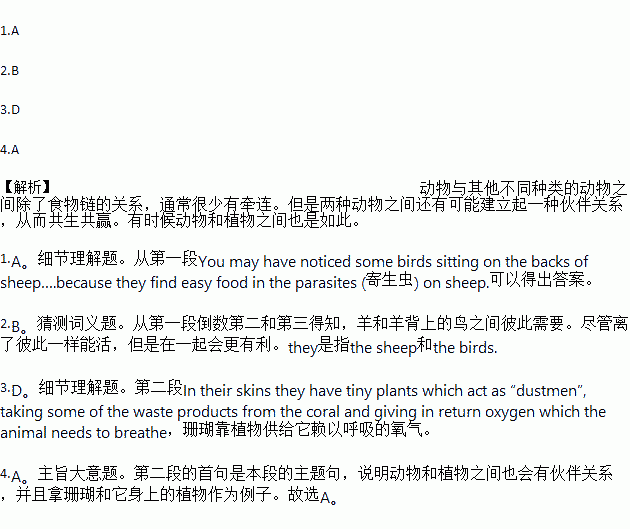题目内容
Most animals have little connection with animals of a different kind, unless they hunt them for food. Sometimes, however, two kinds of animals come together in a partnership (伙伴关系) which is good for both of them. You may have noticed some birds sitting on the backs of sheep. This is not because they want a ride, but because they find easy food in the parasites (寄生虫) on sheep. The sheep allow the birds to do so because they remove the cause of discomfort. So although they can manage without each other, they do better together.
Sometimes an animal has a plant partner. The relationship develops until the two partners cannot manage without each other. This is so in the corals(珊瑚) of the sea. In their skins they have tiny plants which act as “dustmen”, taking some of the waste products from the coral and giving in return oxygen which the animal needs to breathe. If the plants are killed, or are even prevented from receiving light so that they cannot live normally, the corals will die.
1.Some birds like to sit on a sheep because _______.
A. they can eat its parasites
B. they enjoy travelling with the sheep
C. they depend on the sheep for existence
D. they find the position most comfortable
2.The underlined word “they” in the last sentence of the first paragraph refers to ______.
A. birds and parasites B. birds and sheep
C. parasites and sheep D. sheep, birds and parasites
3.We learn from the text that corals depend on plants for______.
A. comfort B. light
C. food D. oxygen
4.What does the second paragraph mainly discuss?
A. Some animals and plants depend on each other for existence[
B. Some animals and plants develop their relationship easily.
C. Some plants depend on each other for food.
D. Some animals live better together.
 寒假天地重庆出版社系列答案
寒假天地重庆出版社系列答案
